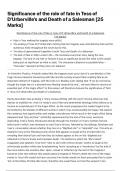Summary
Summary A* AQA ENGLISH LITERATURE B ESSAY - Significance of the role of fate in Tess of D’Urberville’s and Death of a Salesman [25 Marks].
- Course
- Institution
- Book
A* AQA ENGLISH LITERATURE B ESSAY Significance of the role of fate in Tess of D’Urberville’s and Death of a Salesman [25 Marks] Tess of D'Urbervilles and Death of a Salesman Received 24/25 marks
[Show more]




